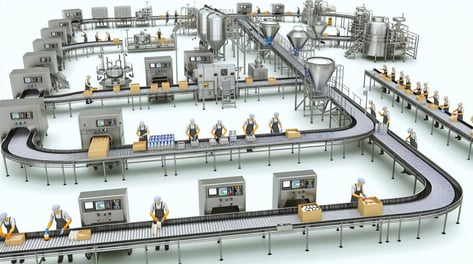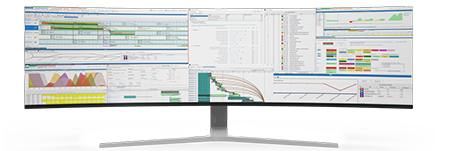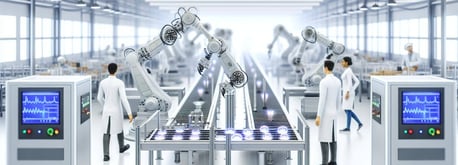AI-Enhanced Production Line Balancing
The role of a Production Scheduler has become increasingly complex in Food and Beverage manufacturing. Meeting customer demands while optimizing resources and maintaining product quality is no small feat. Fortunately, the advent of AI technology has paved the way for significant improvements in production scheduling.
In this blog, we will explore how AI-enhanced Production Line Balancing, integrated with leading Enterprise Resource Planning (ERP), Supply Chain Management (SCM), and Manufacturing Execution Systems (MES) solutions like SAP, Oracle, Microsoft, Kinaxis, Aveva, and others, can revolutionize your food and beverage manufacturing facility.

Production Line Balancing
Production line balancing is at the core of efficient manufacturing in the Food and Beverage industry. It involves optimizing the allocation of resources, such as labor, machines, and materials, to ensure that production lines run smoothly, meet customer demand, and minimize costs. Balancing these factors can be a daunting task for Production Schedulers, especially when dealing with complex recipes, varying demand patterns, and strict quality standards.
Traditional methods of production line balancing often rely on manual processes and historical data. These approaches have limitations in adapting to dynamic production environments and might not fully harness the potential for efficiency improvements. This is where AI steps in.

The Rise of AI in Food and Beverage Manufacturing
Artificial Intelligence (AI) is transforming various industries, and food and beverage manufacturing is no exception. AI-powered solutions can analyze vast amounts of data, learn from patterns, and make real-time decisions to optimize production processes. AI algorithms can be trained to understand the intricacies of your production lines, enabling them to suggest optimal resource allocation, minimize downtime, and improve product quality.
One of the key players in this AI revolution is PlanetTogether, a leading solution for production scheduling and planning. PlanetTogether's AI-enhanced Production Line Balancing capabilities have the potential to reshape the way food and beverage manufacturers operate. Let's delve into how this integration works and the benefits it can bring.
![]()

Integration with ERP, SCM, and MES Systems
The success of AI-enhanced Production Line Balancing relies on seamless integration with your existing systems. PlanetTogether understands this necessity and has designed its solution to integrate with a wide range of Enterprise Resource Planning (ERP), Supply Chain Management (SCM), and Manufacturing Execution Systems (MES). Here are some notable integrations:
SAP Integration
SAP is a global leader in ERP solutions, and integrating PlanetTogether with SAP can create a powerful synergy. This integration allows you to leverage SAP's data and insights while benefiting from PlanetTogether's AI-driven production scheduling. You can achieve real-time synchronization between production schedules and your ERP data, ensuring accurate demand forecasting and resource allocation.
Oracle Integration
Oracle offers comprehensive SCM and ERP solutions, and integrating with PlanetTogether enhances your production planning capabilities. With real-time data exchange between Oracle and PlanetTogether, you can achieve better visibility into your supply chain, streamline operations, and make informed decisions to optimize production.
Microsoft Integration
Microsoft's suite of business solutions, including Dynamics 365, can be seamlessly integrated with PlanetTogether. This integration enables a holistic view of your manufacturing processes, from customer orders to production scheduling. By harnessing the power of Microsoft's cloud infrastructure and AI capabilities, you can enhance your production line balancing efforts.
Kinaxis Integration
Kinaxis is a renowned player in the SCM and RapidResponse market. Integrating PlanetTogether with Kinaxis allows you to combine the strengths of both systems. You can leverage Kinaxis's supply chain visibility and scenario analysis capabilities alongside PlanetTogether's AI-driven production scheduling for better decision-making and resource optimization.
Aveva Integration
Aveva's MES solutions are widely used in manufacturing facilities. Integrating PlanetTogether with Aveva MES enables real-time communication between production scheduling and shop floor operations. This integration enhances your ability to adapt to changes on the shop floor and make data-driven decisions to optimize production efficiency.

Benefits of AI-Enhanced Production Line Balancing
Now that we've discussed the integrations with leading ERP, SCM, and MES systems, let's explore the tangible benefits that AI-enhanced Production Line Balancing can bring to your food and beverage manufacturing facility:
Increased Efficiency
AI algorithms can analyze historical data, current demand, and real-time production conditions to optimize resource allocation. This leads to reduced downtime, minimized production bottlenecks, and increased overall efficiency.
Improved Quality Control
Maintaining product quality is paramount in the food and beverage industry. AI can help ensure that the right ingredients are used in the correct quantities and that production processes adhere to quality standards, reducing the likelihood of defects or recalls.
Enhanced Adaptability
The food and beverage industry often faces fluctuations in demand, ingredient availability, and regulatory changes. AI-powered production scheduling can quickly adapt to these shifts, helping you meet customer demands and stay competitive.
Cost Reduction
By optimizing resource allocation and minimizing downtime, AI-enhanced production scheduling can lead to significant cost savings. This includes reduced labor costs, better inventory management, and more efficient use of equipment.
Real-Time Decision-Making
Integrating AI with ERP, SCM, and MES systems enables real-time data exchange. This empowers Production Schedulers and plant managers with up-to-the-minute information, allowing them to make informed decisions and respond swiftly to changes.
Predictive Maintenance
AI can also predict when equipment is likely to fail, helping you schedule maintenance proactively and avoid costly unplanned downtime.
Sustainable Operations
Efficiency improvements achieved through AI-enhanced production line balancing can contribute to more sustainable manufacturing practices by reducing waste and resource consumption.
How AI-Enhanced Production Line Balancing Works
To fully grasp the power of AI-enhanced Production Line Balancing, let's look into how it works:
Data Collection
The process begins with the collection of data from various sources, including historical production data, demand forecasts, and real-time sensor data from the production floor. This data serves as the foundation for AI-driven decision-making.
Data Analysis
AI algorithms analyze this data to identify patterns, correlations, and potential areas for improvement. These algorithms can consider multiple variables simultaneously, something that would be challenging for humans to do manually.
Optimization
Once patterns are identified, the AI system can create optimized production schedules that take into account factors like resource availability, production capacity, and quality constraints. These schedules are dynamic and can adapt to changing conditions in real-time.
Feedback Loop
AI-enhanced systems continuously learn from their actions and receive feedback from the production floor. This feedback loop allows them to refine their algorithms and make increasingly accurate decisions over time.
Integration with ERP, SCM, and MES
The integration with ERP, SCM, and MES systems ensures that the production schedule aligns with broader business goals and operations. It allows for seamless data exchange, enabling a holistic view of the manufacturing process.
Getting Started with AI-Enhanced Production Line Balancing
If you're ready to embrace the future of food and beverage manufacturing, here are some steps to get started with AI-enhanced Production Line Balancing:
Assess Your Current Processes
Begin by conducting a thorough assessment of your current production scheduling and resource allocation processes. Identify pain points, bottlenecks, and areas where AI can make the most significant impact.
Choose the Right Solution
Select a reputable solution provider like PlanetTogether, known for its AI-driven production scheduling capabilities and robust integration options.
Plan for Integration
Work closely with your chosen solution provider to plan the integration with your ERP, SCM, and MES systems. Ensure that data flows seamlessly between these systems and the AI-enhanced production scheduling solution.
Train Your Team
Training your production scheduling and operations teams is crucial. They should be familiar with the new system and understand how to interpret AI-generated schedules and recommendations.
Monitor and Optimize
Once the system is up and running, continuously monitor its performance and gather feedback from your teams. Use this feedback to fine-tune the AI algorithms and improve overall operations.
AI-enhanced Production Line Balancing is poised to revolutionize the Food and Beverage manufacturing industry. By integrating PlanetTogether's AI-driven production scheduling with leading ERP, SCM, and MES systems like SAP, Oracle, Microsoft, Kinaxis, Aveva, and others, you can unlock a new level of efficiency, adaptability, and cost-effectiveness in your production processes.
Embracing AI technology is not just about staying competitive; it's about ensuring the sustainability and profitability of your food and beverage manufacturing facility in an ever-changing world. With AI-enhanced production scheduling, you can meet customer demands with precision, minimize costs, and maintain the highest quality standards. The future of food and beverage manufacturing has arrived, and it's powered by AI.
Are you ready to take your manufacturing operations to the next level? Contact us today to learn more about how PlanetTogether and integrated scheduling solutions can help you achieve your sustainability goals and drive success in the food and beverage industry.
Topics: Cost Reduction, PlanetTogether Software, Integrating PlanetTogether, Real-Time Decision-Making, Increased Efficiency, Improved Quality Control, Improved Predictive Maintenance, Enhanced Adaptability, Sustainable Operations, Food and Beverage Manufacturing




















LEAVE A COMMENT